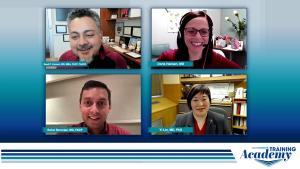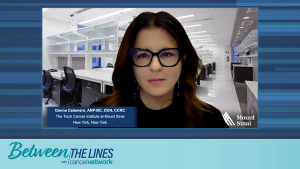Saad Z. Usmani, MD, MBA, FACP
Articles by Saad Z. Usmani, MD, MBA, FACP
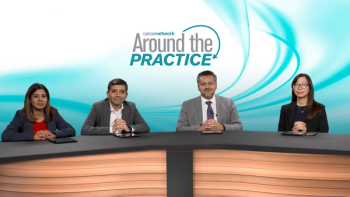
Panelists discuss how successful implementation of chimeric antigen receptor (CAR) T-cell therapy in relapsed/refractory multiple myeloma (R/R MM) depends on early referral, coordinated care between academic and community centers, standardized protocols for patient management, and careful consideration of product selection and timing based on individual patient factors.

Panelists discuss how managing a 68-year-old patient with newly diagnosed multiple myeloma (MM) with suboptimal response to Dara-VRd (daratumumab plus bortezomib, lenalidomide, and dexamethasone) requires careful consideration of timing for CAR T referral, product selection, and bridging strategies, while balancing the patient’s preference against standard transplant options in the context of non-high-risk disease.

Panelists discuss how expanding chimeric antigen receptor (CAR) T-cell therapy into earlier treatment lines for multiple myeloma requires careful consideration of patient selection criteria, treatment sequencing strategies, and infrastructure capacity while awaiting additional clinical evidence.

Panelists discuss how successful academic-community partnerships in delivering chimeric antigen receptor (CAR) T-cell therapy for multiple myeloma patients have evolved through shared learning experiences, established communication pathways, and continuous refinement of collaborative care protocols.

Panelists discuss how managing challenges in the chimeric antigen receptor (CAR) T referral process requires addressing key barriers like timely patient identification, insurance authorization delays, and manufacturing coordination while emphasizing the importance of early referrals from community physicians.

Panelists discuss how effective co-management of chimeric antigen receptor (CAR) T patients requires clear communication protocols, standardized handoff procedures, and ongoing collaboration between academic centers and community practices to ensure safe transitions and optimal long-term monitoring.

Panelists discuss how chimeric antigen receptor (CAR) T-cell therapy’s mechanism of action and treatment workflow requires extensive institutional coordination, from patient selection through bridging therapy and infusion, with varied approaches to managing patients during the manufacturing period across different centers.

Panelists discuss how successful chimeric antigen receptor (CAR) T referrals require close coordination between community physicians and treatment centers, involving detailed patient screening, insurance authorization, and careful timing of apheresis and manufacturing to optimize outcomes.

Panelists discuss how patient selection criteria and individual characteristics help determine whether ide-cel or cilta-cel is the more appropriate chimeric antigen receptor T-cell therapy choice for early-line treatment in patients with multiple myeloma.

Panelists discuss how institutional decisions to implement early-line chimeric antigen receptor T-cell therapy for relapsed/refractory multiple myeloma are influenced by patient characteristics, logistical capabilities, cost considerations, and subsequent treatment strategies.

Panelists discuss how the CARTITUDE-4 and KarMMa-3 trials differ in their patient populations, study designs, and outcomes, providing crucial insights for clinicians choosing between cilta-cel and ide-cel chimeric antigen receptor T-cell therapies in relapsed/refractory multiple myeloma.

Panelists discuss how early-line chimeric antigen receptor T-cell therapy studies, including recent data from trials of cilta-cel (Popat et al) and ide-cel (Ailawadhi et al), are showing promising results in patients with relapsed/refractory multiple myeloma, suggesting potential benefits of moving these treatments into earlier therapeutic settings.
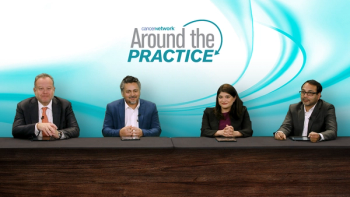
Panelists discuss effective strategies for promoting the adoption of bispecific antibodies in relapsed/refractory multiple myeloma (R/R MM) treatment, emphasizing the importance of educational initiatives, improving care transitions between academic and community settings, addressing misconceptions, and sharing key takeaways and clinical pearls for community oncologists.

Panelists discuss strategies for sequencing bispecific antibodies with B-cell maturation antigen (BCMA)–targeted therapies, considering factors such as prior CAR T-cell treatment, the impact of relapse timing on treatment decisions, and approaches for managing high-risk cytogenetics and extramedullary disease in relapsed/refractory multiple myeloma (R/R MM).

Panelists discuss the rationale behind combination strategies with bispecifics in relapsed/refractory multiple myeloma (R/R MM), highlighting key studies such as RedirecTT-1 for teclistamab and talquetamab, TRIMM-2 for talquetamab and daratumumab, and MagnetisMM-32 for elranatamab, along with considerations for step-up dosing and outpatient administration protocols.

Panelists discuss recent updates in the management of relapsed/refractory multiple myeloma, focusing on key studies such as MonumenTAL-2 for talquetamab, long-term follow-up data from the phase 1/2 MajesTEC-1 for teclistamab, and findings from MagnetisMM-3 regarding elranatamab.

Panelists discuss how the current treatment landscape for relapsed/refractory multiple myeloma (R/R MM) includes standard options like such as IMiDs, PIs, and mAbs, while highlighting the emergence of novel therapies such as CAR T- cells and bispecific antibodies, which address unmet needs and offer potential advantages in treatment efficacy and patient outcomes.
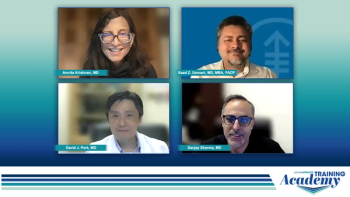
The panel concludes its discussion with insights on practices for educating health care teams on CAR T-cell therapy administration, highlighting the evolving role of advanced practice providers.
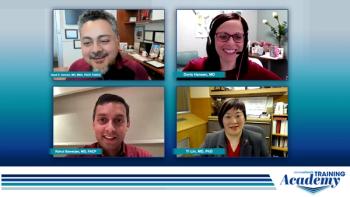
Future Perspectives on CAR T-Cell Therapy in Relapsed/Refractory MM
BySaad Z. Usmani, MD, MBA, FACP,Rahul Banerjee, MD, FACP,Doris Hansen, MD,Yi Lin, MD, PhD The panel concludes its discussion with key takeaways on the evolving role of CAR T-cell therapy in the treatment of patients with relapsed/refractory multiple myeloma.

Insights from CARTITUDE-4 and KarMMa-3 in R/R MM
BySaad Z. Usmani, MD, MBA, FACP,Rahul Banerjee, MD, FACP,Doris Hansen, MD,Yi Lin, MD, PhD Experts on multiple myeloma provide their impressions of the CARTITUDE-4 and KarMMa-3 studies, which led to the approval of cilta-cel and ide-cel in earlier lines of treatment for patients with relapsed/refractory disease.

CAR T-Cell Therapy in R/R MM: Treatment Selection, Safety, and Future Perspectives
BySaad Z. Usmani, MD, MBA, FACP,Rahul Banerjee, MD, FACP,Doris Hansen, MD,Yi Lin, MD, PhD Myeloma specialists have a comprehensive discussion on CAR T-cell therapy, highlighting treatment selection considerations, adverse event management strategies, unmet needs, and ongoing research.

Key Takeaways from the CARTITUDE-1 and KarMMa Studies
BySaad Z. Usmani, MD, MBA, FACP,Rahul Banerjee, MD, FACP,Doris Hansen, MD,Yi Lin, MD, PhD Focusing on later lines of therapy for patients with relapsed/refractory multiple myeloma, the panel provides key takeaways on the CARTITUDE-1 and KarMMa trials that investigated cilta-cel and ide-cel.

How CAR T-Cell Therapy Impacts Relapsed/Refractory MM Treatment
BySaad Z. Usmani, MD, MBA, FACP,Rahul Banerjee, MD, FACP,Doris Hansen, MD,Yi Lin, MD, PhD Yi Lin, MD, PhD, provides insights on the impact of CAR T-cell therapy on the evolving multiple myeloma treatment landscape.

The Impact of CAR T-Cell Therapy on Relapsed/Refractory MM Treatment
BySaad Z. Usmani, MD, MBA, FACP,Rahul Banerjee, MD, FACP,Doris Hansen, MD,Yi Lin, MD, PhD Rahul Banerjee, MD, FACP, discusses how the emergence of CAR T-cell therapy has impacted the multiple myeloma treatment landscape by addressing unmet needs and improving patients’ quality of life.

The Rationale for CAR T-Cell Therapy in Relapsed/Refractory Multiple Myeloma
BySaad Z. Usmani, MD, MBA, FACP,Rahul Banerjee, MD, FACP,Doris Hansen, MD,Yi Lin, MD, PhD A panel of experts on multiple myeloma discuss the rationale for CAR T-cell therapy, highlighting BCMA as a target and treatment administration practices.
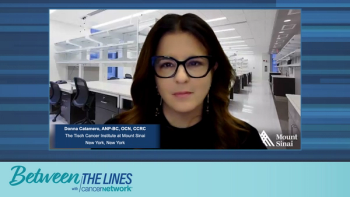
Following a review of MonumenTAL-1, experts on multiple myeloma discuss the conclusions from the clinical trial and provide their impressions of the findings.

A panel of experts on multiple myeloma discuss dermatologic adverse effects seen in patients receiving talquetamab, including nail toxicities.
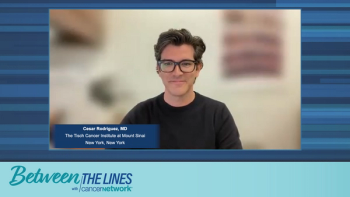
Multiple myeloma specialists discuss patient education approaches regarding the management of oral toxicity stemming from talquetamab treatment and outline potential research approaches.

Following a review of oral adverse events, the expert panel discusses how to manage oral toxicities seen in patients with multiple myeloma who are treated with talquetamab.

A panel of experts on multiple myeloma reviews GPRC5D-related oral toxicities seen in patients receiving treatment.








